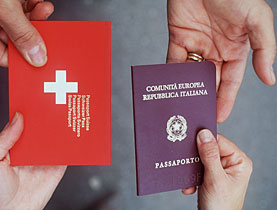Voters rule on rightwing citizenship procedure

Polls have closed in a nationwide vote to reinstate the controversial use of the ballot box to decide on naturalisation applications.
Also on the cards were plans to limit the information given out by the federal authorities ahead of nationwide votes, and the latest health system reform proposal.
Results are expected shortly, but trends published by the gfs.berne polling and research institute indicate that all three proposals, supported by the rightwing Swiss People’s Party, will be turned down.
Five years ago the Federal Court outlawed the ballot box as a way of dealing with citizenship requests. It followed a series of allegedly discriminatory decisions, particularly against people of Balkan origin.
The court argued rejected candidates must have the right of appeal.
However, the Swiss People’s Party argues that it is up to local communities to decide on the citizenship procedure they use – whether public assembly, special panel or secret vote at the ballot box. It also wants to deny candidates the right of appeal.
The party mounted a vigorous campaign in support of its initiative, including the reappearance of its infamous poster showing hands grabbing Swiss passports.
Opponents, including the government, three of the four main parties as well as legal experts, say that reinstating the banned citizenship procedure would be discriminatory.
Switzerland, which has around 20 per cent foreigners, is widely held to have one of the toughest naturalisation processes in Europe, with people needing to wait 12 years before being eligible to apply. This compares with between four and ten years in European Union states.
This is not the first time that citizenship issues have come to vote. In 2004, the Swiss rejected simplified naturalisation procedures for second- and third-generation foreigners.
A poll commissioned by the Swiss Broadcasting Corporation (SBC), swissinfo’s parent company, and published ten days before the ballot, found that just around one-third of the respondents supported the plan.
Information and health
The second initiative up for vote is on information rules. A group of staunch conservatives, supported by the People’s Party, wants to limit what federal authorities can say before ballots.
Those behind the initiative say that the government should not use taxpayers’ money for “propaganda”. But opponents say it’s the government’s job to give its point of view on the issues concerned.
The health ballot concerns a parliamentary proposal, supported by the government, to make the health insurance system more competitive and transparent – and ultimately less expensive.
Switzerland’s health costs, already among the highest in the world, have been subject of much debate in the country.
The plan calls for the constitution to be amended to include an article giving a broad outline for the health system: quality, competition and the principle of free choice. It is argued that these principles are general and already in use.
Those against say that it paves the way for health insurance companies to bolster their position against the other players in the health sector, particularly doctors and the country’s 26 cantons.
There have also been warnings of higher costs for patients and an end to unrestricted access to doctors.
This is the latest attempt to overhaul the system. The Swiss have voted on health matters at least five times in the past decade.
swissinfo
Foreign residents must wait at least 12 years to be eligible to apply for naturalisation.
Foreigners married to Swiss nationals can take advantage of a simplified procedure, reducing the number of years they have to wait.
Successful applicants must show that they are integrated into Swiss society, comply with Swiss law and pose no threat to internal or external security.
The cantonal and local authorities are responsible for naturalisation procedures, either by public assembly or by a special panel.
Five years ago the Federal Court banned the use of the ballot box to decide on citizenship applications, saying rejected candidates must have a right of appeal.

In compliance with the JTI standards
More: SWI swissinfo.ch certified by the Journalism Trust Initiative











You can find an overview of ongoing debates with our journalists here . Please join us!
If you want to start a conversation about a topic raised in this article or want to report factual errors, email us at english@swissinfo.ch.